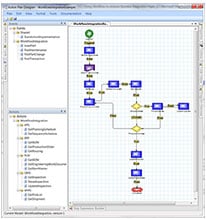This blog post was written by Fred Wentzel, executive vice president of the National Council for Advanced Manufacturing.
A highly skilled workforce is the lifeblood of any successful company, industry, or national economy. The U.S. has been the breeding ground for the world's most innovative economy, companies, and products in large part because it offered a diverse pool of talented, highly educated workers. But evidence of a decline is surfacing, precipitated by three gathering trends: an increasingly ill-prepared domestic workforce, a steadily depleting stock of highly skilled and educated foreign nationals, and an aging population.
During most of the 20th century, the U.S. economy provided Americans with a high quality of life that was unparalleled across the globe. This vitality was the result of the rising productivity of our skilled workforce, increasing technological advances, and many successfully commercialized innovations.
Fourteen years into the 21st century, the tide seems to be turning in large part because of the impact of globalization, reduced research and development spending, and the expanding economies of Asia. Many U.S. workers today are competing with lower-wage workers outside the U.S. and seeing jobs disappear because of the effect of technological change on the U.S. workforce. The advantages American workers had in the 20th century are eroding, especially as many small and medium-size companies find it more difficult to compete with foreign companies both at home and abroad.
Equally disturbing is the fact that the U.S. education system is not keeping pace with the nation's changing knowledge needs and is not providing students and workers with the knowledge and skills they need to compete successfully in the more and more technical 21st century global economy.
Too many middle and high school students lack the reading, writing, and STEM (science, technology, engineering, and mathematics) skills they need to succeed in post-secondary education and the ever-changing world of work . . . too many students drop out of high school before graduating...and too many high school graduates never enroll in post-secondary schools.
Learning System Policies Built on Six Basic Principles
- Promote and support the adoption of appropriate, validated, and rigorous world-class learning standards, assessments, and curricula for pre-K-16 students
- Include applied learning in the curricula for all students in grades pre-K-12, leveraging business/education partnerships to ensure workplace-relevant learning activities
- Require all graduating high school students to demonstrate mastery of the academic and workplace competencies outlined in the ETA Competencies Model
- Strengthen career counseling for students in grades 7-12 to help ensure that graduates gain access to postsecondary schools or productive employment
- Assist adult workforce members to master nationally recognized academic and workplace competencies and commit themselves to lifelong learning by upgrading their skills and/or acquiring new skills to remain in productive employment for as long as they wish to do so
- Periodically rethink and change existing learning paradigms to ensure these principles are achieve
If students and workers are to compete successfully in the 21st century workforce, they must have access to a learning system that provides knowledge and skills built on world-class academic and workforce standards.
To address these growing challenges and to help U.S. students gain access to the knowledge and skills they need to function successfully in the global economy, the National Council for Advanced Manufacturing (NACFAM) recommends that business, education, government, labor, trade and professional associations, and the nonprofit sectors collaborate at the federal, state, regional, and local levels to incorporate the six basic principles contained in the recommendations for America's 21st Century Learning System in any future public policies.

NACFAM strongly believes that the adoption of appropriate, validated, and rigorous world-class learning standards, assessments, and curricula applies to primary, secondary, and post-secondary learning . . . and even to the graduate and post-graduate levels. It also calls for "applied learning" to be required for all students in pre-K to grade 12. This experience will show students "where and how what they learn" is frequently used or applied in the contemporary workplace. Students must realize that the reason they learn is so they can eventually earn. This is one of the cardinal principles of the free enterprise system.
About the Author
Fred Wentzel is the executive vice president of the National Council for Advanced Manufacturing (NACFAM), with whom he has been associated for fourteen years. He has focused primarily on building member support for policies to strengthen the U.S. economy and revitalize the nation's manufacturing sector. Before joining NACFAM, he was senior vice president of the National Alliance of Business, where he worked for 30 years on executive recruitment, corporate relations, and workforce development policy.
A version of this article also was published at InTech magazIne.




